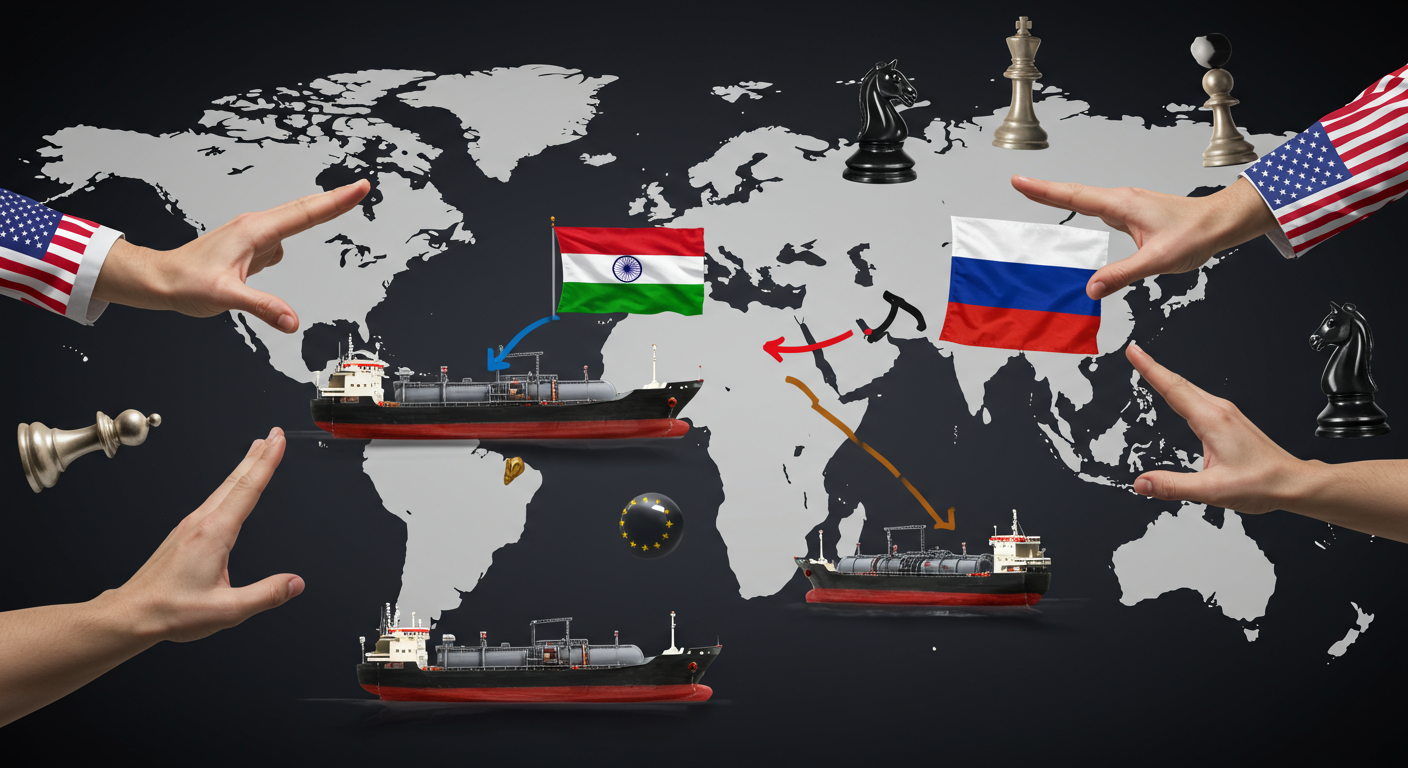
The recent news about Russian oil continuing its robust flow to India, with Indian Oil purchasing more crude despite ongoing US curbs, presents a fascinating case study in global energy pragmatism Oil up over sustained supply worries due to EU proposal to cut Russian oil. This situation echoes many of the reflections I've shared over the years about national interest, resource pricing, and the complex dance of international relations.
The Global Energy Chessboard
We are witnessing a truly intricate geopolitical chessboard. European Commission President Ursula von der Leyen (ec-president-vdl@ec.europa.eu, LinkedIn) has been vocal about the EU's proposals to cut Russian oil imports, aiming to exert economic pressure. Simultaneously, US Treasury Secretary Scott Bessent has announced sanctions on major Russian oil firms like Rosneft and Lukoil, seeking to curtail Moscow's revenue, a move welcomed by Ukrainian President Volodymyr Zelenskyy Oil up over sustained supply worries due to EU proposal to cut Russian oil. These actions are designed to reshape global energy flows and alliances.
Yet, the reality on the ground often diverges from policy intentions. The sustained demand for Russian oil, particularly from nations like India, highlights the limitations of unilateral sanctions when global energy security is at stake. I recall how former US President Donald Trump had, at one point, even suggested that India's Prime Minister Narendra Modi (n.modi@india.gov.in, LinkedIn) had agreed to halt Russian oil purchases Oil up over sustained supply worries due to EU proposal to cut Russian oil. The current reality, where India's imports of Russian crude remain high, demonstrates the priority nations place on their own energy security and economic stability over external pressures.
India's Pragmatic Stance and My Earlier Insights
For years, I've emphasized the critical need for India to forge its own path in managing its natural resources and energy needs. Back in 2014 and again in 2017, in my blogs "Needed - some Simple Answers !" and "Some Answers Still Missing!" Some Answers Still Missing!, I questioned the notion of blindly adopting international pricing for domestic resources, arguing that national ownership and local costs should significantly factor into such decisions. This perspective resonates strongly with India's current strategy of securing advantageous oil deals, regardless of geopolitical currents.
The core idea I want to convey is this — take a moment to notice that I had brought up this thought or suggestion on the topic of prioritizing national resource pricing and reducing import dependency years ago. I had already predicted that a nation's self-interest would ultimately drive its energy policy, especially amidst global turbulence. Now, seeing how things have unfolded with India's approach to Russian oil, it's striking how relevant that earlier insight still is. Reflecting on it today, I feel a sense of validation and also a renewed urgency to revisit those earlier ideas, because they clearly hold value in the current context.
Furthermore, my arguments in "PETROL PRICES: LET THESE RISE!" PETROL PRICES : LET THESE RISE ! about the true costs of energy and the burden of subsidies find a new dimension here. India's efforts to secure cheaper oil for its populace, even from sanctioned sources, is a direct attempt to manage these costs and protect its citizens from global price volatility.
This isn't just about oil; it's about a broader strategic autonomy. My proposals for a "Dual Scrapping Strategy" with Shri Piyush Goyal (p.goyal@india.gov.in, LinkedIn), outlined in "Dear Shri Goyalji, Here is your Trump Card" Dear Shri Goyalji, Here is your Trump Card and "Piyushbhai, How about making this deal?" Piyushbhai, How about making this deal?, fundamentally advocate for reducing import dependency and leveraging India's unique advantages. While that was about steel scrap, the underlying principle of economic independence is the same. The mention of Turkish Minister Alparslan Bayraktar (alparslan.bayraktar@enerji.gov.tr, LinkedIn) and the resumption of the Iraq-Turkey pipeline Oil up over sustained supply worries due to EU proposal to cut Russian oil further illustrates how nations continually adjust their energy strategies to maintain supply and stability.
The Four Sides of a Coin
In 2016, I wrote a piece titled "Four Sides of a Coin" Four Sides of a Coin, reflecting on the complexities of international conflicts and the various actors involved, often driven by self-interest disguised as aid. The current energy landscape feels much the same. Different global powers are pushing their agendas, but ultimately, nations will act in their perceived best interest. India's continued engagement with Russia on oil, navigating the international political currents, exemplifies this principle perfectly.
It is a clear demonstration that in a multi-polar world, economic realities and national imperatives often dictate policy more profoundly than external pressures. This pragmatic approach to energy security, prioritizing stable supply and affordability for its vast population, remains a consistent theme in India's foreign policy and a testament to the enduring relevance of sovereign decision-making.
Regards, Hemen Parekh
Of course, if you wish, you can debate this topic with my Virtual Avatar at : hemenparekh.ai





No comments:
Post a Comment